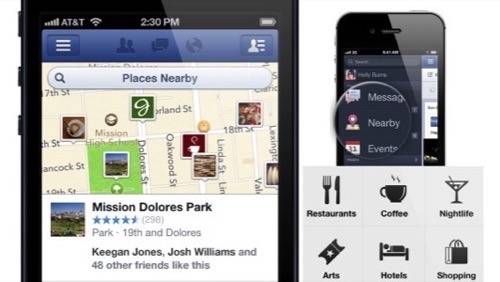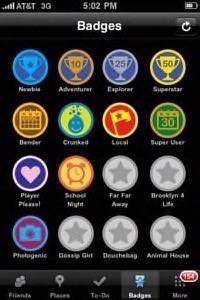
Facebook just home-brewed its own Foursquare – and the giant social network isn’t stopping there. Places, Facebook’s first “Foursquare-killer”, got nixed last year. Now the company is back in the mobile check-in sphere and it’s way better prepared.
With an update to a quaint little tab called “Nearby” on Monday, Facebook’s expanding mobile strategy is finally taking shape. Watch out, though, there’s going to be collateral damage.
Facebook Doubles Back
After Places flopped, Facebook snatched up Gowalla, a Foursquare competitor co-founded in 2007 by Josh Williams and Scott Raymond. It also bought Glancee, an app that emerged out of this year’s brief obsession with ambient location services. “While Josh Williams is leading the location team that built Nearby, former Gowalla employees are working on other products at Facebook, including Scott Raymond who’s working on our mobile photo products,” a Facebook spokesperson told ReadWrite. “We spent a lot of 2012 working to improve the foundation of our mobile products and today’s update to Nearby positions us well to offer more location aware features on mobile in the new year.”
A Facebook Newsroom blog post about its latest mobile update might as well be describing Foursquare: “…open the [Nearby] tab to find local spots your friends have recommended, checked into, or liked. If you’re looking for a place to eat, choose a category like Restaurants to see what’s nearby… tap to see info like friends who’ve been there and business hours.”
Uh-oh.
Making Money On Mobile… Finally?
If Nearby gains traction, it could be mean big things for Facebook’s mobile revenue stream. Monday’s update is only the beginning of Nearby’s new direction, one sure to be long and lucrative for Pages. Nearby was formerly a pretty bare bones way to check in to a spot and tag who you’re hanging out with, but it won’t be a quiet feature for long.
The newly robust vision of Nearby sure pulls the company’s acquisition of geosocial Foursquare rival Gowalla into clearer view. Gowalla boarded up its windows this March, officially integrating into Facebook’s team, ostensibly to beef up Timeline.
Earlier this year, Facebook admitted that it “[did] not currently directly generate any meaningful revenue from the use of Facebook mobile products” before Zuckerberg did a 180 this fall, declaring that not only is Facebook ramping up in mobile, but that it’s actually a full-fledged “mobile company” now.
With Nearby evolving into Facebook’s own Foursquare, brands will have a direct line to the 600 million people who log into Facebook on mobile. And this is just the beginning – the feature will grow as users start checking in, rating and reviewing local businesses.
So now that Facebook’s been newly infused with Gowalla’s know-how, where does Glancee come in? ReadWrite founder Richard MacManus placed his bets earlier in 2012, and they’re still looking good:
“My bet is that Facebook will soon make use of the technology in a new mobile location product. Its primary focus is likely to be “social discovery,” a term Andrea Vaccari used when describing Glancee in our SXSW interview.
Where Places failed for Facebook is that people didn’t manually check in enough at locations. One benefit of Glancee is that it removes the need to check in. Another benefit is that it mines Facebook for interest data, which is then used to make social connections. This is something that Facebook is surely very interested in exploring, as it seeks new ways to tie social networking into mobile.”
Badges Are So 2010
Foursquare may still be growing, but it offers little that’s compelling to new users. In September 2012, the geosocial app boasted 25 million users, up from 20 million in April. But most of Foursquare’s members use it to complement a major social network, namely Facebook or Twitter.

Before Facebook came back with its new mobile direction, Foursquare might have been distinct enough to stand its ground. When Foursquare first hit, it had that playful, mobile-only vibe that makes Instagram feel fun. It gamified everyday life, awarding in-app badges for patterns of activity and special check-ins. Foursquare devotees and badge-junkies might still enjoy the thrill of unlocking a rare virtual reward, but the novelty is wearing thin.
Beyond Foursquare, Yelp could be in threatened too. If local businesses take their proverbial business elsewhere, the company’s ad-powered revenue stream could be seriously endangered. But the local-reviews leader hedged its bets against Facebook considerably better than Foursquare did. Yelp is stuffed to the gills with unique, user-submitted data.
Google has its own check-in and local reviews tricks up its sleeve – Google has a bit of everything, after all. Now that Google+ is the epicenter of its social universe, Google’s geosocial long-game is anyone’s guess, but Google is anything but a one-trick pony.
Check-Ins Come Standard
Foursquare has come a long way over the years, but it’s still all about check-ins. Instagram’s location-tagging service is powered by Foursquare, and Foursquare check-ins can be zapped to a Facebook Timeline. The problem is that check-ins are a nice tool for adding depth to more interesting activities, like photo sharing. But they’re an afterthought – not an app-worthy activity in their own right.
With Facebook’s aggressive new mobile direction materializing, Foursquare had better be looking over its shoulder. If check-ins now come standard with other, richer social experiences, why open Foursquare at all?
Why indeed?
















